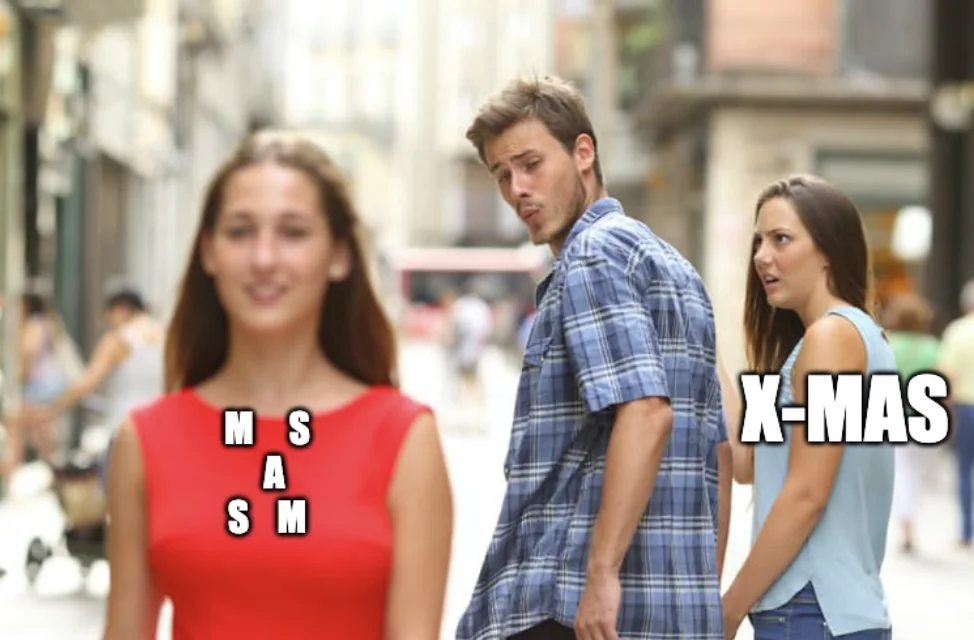Criss-Crossing XMAS Clues

Ah, word searches! I've been solving them for as long as I can remember, and I pride myself on being pretty good at them 😎
Was I tempted to avoid writing any code and just solve today's puzzle manually? Sure I was! After finding the solution, which in my case was 2524 XMAS instances hidden in the input, though, I'm glad I didn't commit to it 😁
Part 1 was as easily understandable as it sounds: we need to find all instances of the word XMAS in the grid - horizontally, vertically or diagonally, both forwards and backwards.
After processing the input to map each coordinate to the corresponding character, as I usually do, I decided to structure my solution as follows:
- find all
Xcharacter in the grid; - continue in each direction to gather the three remaining characters, and verify if, once concatenated, they form the word
XMAS.
This translated into the following code:
grid.forEach((value, cell) => {
if (value === 'X') {
const all = getAllCandidates(Coord.deserialize(cell), grid);
const localXmasCount: number = all.filter((s) => s === 'XMAS').length;
xmasCount += localXmasCount;
}
});
The getNeighbors function is simply doing some additions on the Cartesian plane:
function getNeighborCoords(source: Coord, includeDiagonals: boolean = false) {
const neighbors = [
new Coord(source.x, source.y - 1), // N
new Coord(source.x, source.y + 1), // S
new Coord(source.x + 1, source.y), // E
new Coord(source.x - 1, source.y), // W
];
if (includeDiagonals) {
neighbors.push(...getDiagonalCoords(source));
}
return neighbors;
}
function getDiagonalCoords(source: Coord) {
const coords = []; // Clockwise
coords.push(new Coord(source.x + 1, source.y - 1)); // NE
coords.push(new Coord(source.x + 1, source.y + 1)); // SE
coords.push(new Coord(source.x - 1, source.y + 1)); // SW
coords.push(new Coord(source.x - 1, source.y - 1)); // NW
return coords;
}
getAllCandidates on the other hand returns the coordinates of the three cells surrounding our X in each direction.
Might look complicated but it's really not: each candidateDelta considers X as the (0,0) point and derives the lists of 3 coordinates in each direction.
For example XMAS written horizontally left to right would have X=(0,0), M=(1,0), A=(2,0), S=(3,0); if it was right to left, the coordinates would be X=(0,0), M=(-1,0), A=(-2,0), S=(-3,0), and so on.
function getAllCandidates(cell: Coord, grid: Grid) {
const candidateDeltas = [
['{0,0}', '{1,0}', '{2,0}', '{3,0}'],
['{0,0}', '{-1,0}', '{-2,0}', '{-3,0}'],
['{0,0}', '{0,1}', '{0,2}', '{0,3}'],
['{0,0}', '{0,-1}', '{0,-2}', '{0,-3}'],
['{0,0}', '{1,1}', '{2,2}', '{3,3}'],
['{0,0}', '{-1,-1}', '{-2,-2}', '{-3,-3}'],
['{0,0}', '{1,-1}', '{2,-2}', '{3,-3}'],
['{0,0}', '{-1,1}', '{-2,2}', '{-3,3}'],
];
const candidates: string[] = [];
candidateDeltas.forEach((deltas) => {
const coords: Coord[] = deltas.map((delta) => {
return new Coord(cell.x + delta.x, cell.y + delta.y);
});
const values = coords
.filter((c) => grid.has(c))
.map((c) => grid.get(c)); // Filter the coordinates within the grid
candidates.push(values.join(''));
});
return candidates;
}
In part 2 we learn that we misunderstood the original instructions: it's not a XMAS puzzle - it's a X-MAS puzzle 😁
The goal is to find all the two MAS arranged as an X, basically like this:
M.S
.A.
M.S
Apart from a stupid bug that made me waste some time, I actually found this part easier than the previous one, if anything for the number of steps involved: I simply had to find all A in the grid and check if their diagonal neighbors are some variant of MMSS, meaning that they form an X combined with the central A.
grid.forEach((value, cell) => {
if (value === 'A') {
const neighbors = getDiagonalNeighbors(Coord.deserialize(cell), grid);
const str = neighbors.join('');
if (
str === 'MMSS' ||
str === 'SSMM' ||
str === 'SMMS' ||
str === 'MSSM'
) {
xmasCount++;
}
}
});
It's important that the Ms and Ss are consecutive pairs: in the example above, starting from the top-left M, we get MSSM; if we started from the top-right S, it would be instead SSMM - essentially we want to exclude SMSM and MSMS, which would represent a "wrong" type of X-MAS:
M.S
.A.
S.M
Obviously MAM and SAS are not quite what we want 🤔
Of course in order to detect the correct instances of X-MAS my way, the neighbors list needs to be ordered: clockwise or counter-clockwise doesn't really matter, and neither does the edge we start from - but the list needs to follow any of these orders. Otherwise, if I had, say:
coords.push(new Coord(source.x - 1, source.y - 1)); // NW
coords.push(new Coord(source.x + 1, source.y - 1)); // NE
coords.push(new Coord(source.x + 1, source.y + 1)); // SE
coords.push(new Coord(source.x - 1, source.y + 1)); // SW
so an order like
1 2
3 4
then a case like
M.S
.A.
S.M
would still be concatenated as MSSM and counted as a valid X-MAS, while it's clearly not 🤦♀️
Lesson learned: after 9 years I can safely say that wrong assumptions are the source of 90% of the bugs I face while doing the AoC challenged. For now, still, that's two more shiny stars in the bag! 🌠